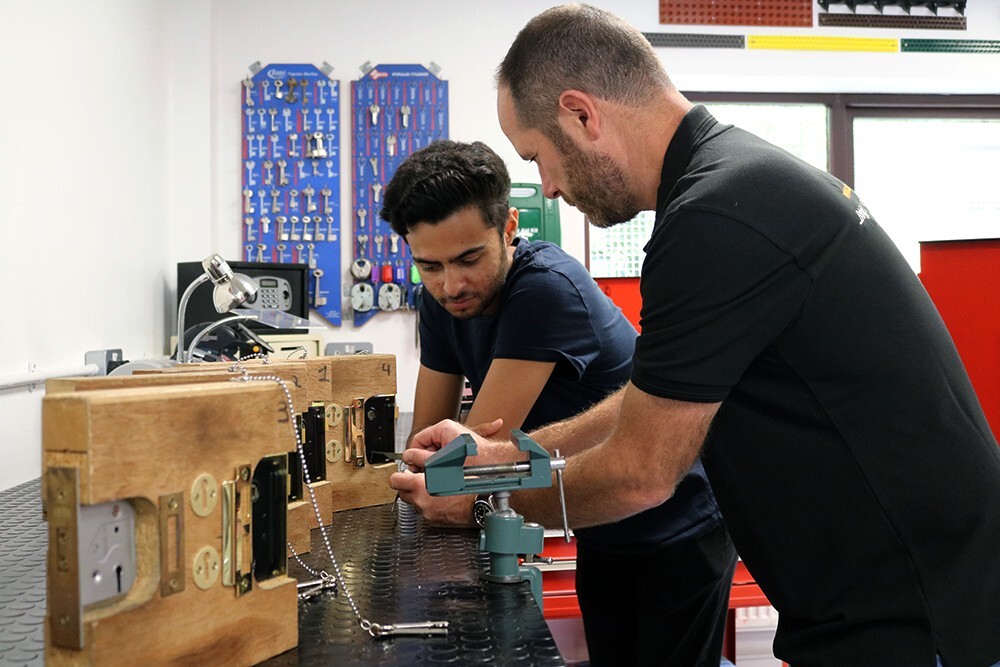
You can work as a locksmith wherever you want in the UK. Whether on the Scottish islands or down the south coast, you can make your living as a locksmith. Several courses and qualifications are available to help you get started in the industry.
Qualifications to be a locksmith
Several different qualifications are available to people wanting to work as a locksmith. Vocational courses are offered by the BTEC and City & Guilds, and NVQs for those wishing to specialize in security. There are also Continuing Professional Development courses for locksmiths to ensure they have the skills and knowledge they need to provide the best service to their customers.

In addition to completing a formal qualification, aspiring locksmiths can also gain experience by undertaking an apprenticeship or completing a degree course in locksmiths Peterborough. Many locksmith training courses focus on the technical aspects of locksmithing and require that applicants have practical skills and an interest in the industry. Some may also have some carpentry experience, although this is not necessary to become a locksmith.
In addition to obtaining a recognised qualification, locksmiths can also choose to train at the Keytek (r) Locksmith Academy. The academy offers a comprehensive range of locksmith training and has achieved NCFE-approved centre status. Upon completion of the training, aspiring locksmiths can begin working as a locksmith and choose their working hours.
Depending on your chosen course, you may also need a business license. Some locksmith training courses are free, but others require a fee. As such, it is important to research any locksmith training course before deciding. However, the training should be accredited if you want to work as a locksmith.
If you have a busy schedule and do not have the time for full-time study, you may want to consider distance learning. There are many reputable online locksmith schools. Some offer full and part-time apprenticeships that include a level two qualification in locksmithing.
Training courses
In the UK, there are several training courses for locksmiths. The Office of Qualifications and Examinations Regulation (Ofqual), a non-ministerial government department, regulates the locksmith qualification. With an official qualification, a locksmith is guaranteed to meet industry standards and the Health and Safety at Work Act 1974. Many financial grants and private loans are also available to help students finance their courses.
The locksmithing industry is incredibly diverse, with jobs available all over the UK. As a result, there is almost always a constant flow of work. Each day, people are moving house, which means that locks need changing. In addition, landlords need to change locks to keep tenants safe. Additionally, thousands of businesses in the UK need to maintain security.
The courses are modular and are available at different levels. A one-day course will provide the minimum knowledge required for locksmiths, and a five or ten-day course will provide a more comprehensive education. The courses will cover the basics of locksmithing, from breaking cars to programming keys and access control systems.
In addition to formal education, locksmiths can choose to pursue apprenticeships. Apprenticeships allow entry-level locksmiths to shadow experienced professionals. Some apprenticeships are paid, but most are voluntary. Those who choose this route should make sure that they find a qualified mentor or a reputable locksmith before signing up for an apprenticeship.
There are numerous Locksmith training courses in the UK. Some courses are accredited by the NCFE, while others are not. Whether you choose to study online or through a local locksmith academy, make sure to research the accreditation.
DBS check
Locksmiths may require a DBS check depending on the area you operate in and how frequently you perform work. These checks will protect you and your customers. You can apply online to get a standard DBS check for locksmiths. If you are working in a hospital or school, you may need to obtain a DBS check to work there.
A DBS check for locksmiths is a legal requirement in the UK. It’s a statutory criminal record check carried out by the Disclosure and Barring Service, a department within the Home Office. DBS checks are designed to protect the public by revealing a person’s convictions.
The MLA, the professional body for locksmiths in the UK, requires locksmiths to complete a DBS check. This enables them to be vetted independently and prove their trustworthiness to their customers. The MLA campaigned to have locksmiths placed on the Rehabilitation of Offenders Act in 2009.
When looking for a locksmith for your emergency needs, you should choose a locksmith with a DBS check. This is important because the DBS check lets you know if the locksmith is a convicted criminal. Another important consideration is pricing policy.
Some locksmiths will quote one price on the phone and then raise the price after the work is completed. It is important to know the total price before work begins and to sign an agreement stating the final price.
Before hiring a locksmith in Horsham, be sure to check their background. A DBS check will reveal any criminal history, so ensure you work with a reputable company. You can easily find out if a locksmith has a clean DBS by looking for a few reviews online.
Industry recognised qualifications
There are several advantages of having an industry-recognised qualification in being a locksmith in the UK. First, a license ensures that your work is legitimate and professional. You can market yourself more easily and be more confident. Second, a license allows you to show potential customers that you have the right skills and can handle security issues effectively.
Third, an industry-recognised qualification means you can practice locksmithing anywhere in the UK. Several locksmith courses are available, but the most popular is to undergo an apprenticeship, which can take up to 12 months. Whether you are an apprentice or work in a company, you will need to be able to prove your skill level to potential employers and customers. You can also find a locksmithing school accredited by the City and Guilds.
If you wish to become a locksmith, you can take the Master Locksmiths Association’s apprenticeship course, which is nationally recognised. Locksmithing associations also offer several other training courses. These do not lead to specific locksmith qualifications but are useful as stepping stones to becoming a locksmith.
The BLI course requires you to become a student member and provide references to prove your skills. In addition, you will need to pass a criminal record check to get your qualification. There are different training centres across the UK offering locksmithing accreditation. For example, Keytek (r) Locksmith Academy offers Level 4 accreditation and has gained NCFE-approved centre status.
A locksmith course can take one week, depending on whether you have any prior carpentry experience. Other applicants may require months or years of training to gain the skills and knowledge they need to work as a locksmith. Successful locksmiths have flexible working hours and can earn a high salary.
Finding a job
If you’re interested in becoming a locksmith in the UK, the good news is that there are numerous opportunities for work in this field. Locksmiths are required in all parts of the country. They can choose to specialise in a particular area, such as car security, electronic key card locks, or safes.
The first step in finding a locksmith job is to search for listings in your local area. You can check online locksmith directories or indeed.com to search for vacancies. You should then fix up your CV and practice your interview techniques. You should be prepared for the standard and more specialised interview questions.
A locksmith must have a passion for the locksmith industry. They must have strong problem-solving and practical skills. They must also have a high level of education and training. An apprenticeship with a master locksmith is a good way to get started. The training period for a locksmith can be up to four years. After that, you can start your own business. While locksmithing is not regulated by the government, completing a Disclosure and Barring Service check is essential before working in the field.
Locksmiths can also work in a fast-growing city. Many developing cities have office spaces, shops, and other commercial spaces that need security. This means that locksmiths need to be available to meet this demand. The growth of cities and towns means that there are more opportunities than ever before for locksmiths.
Locksmith training is largely on-the-job, but there are specialist courses for locksmiths. The Master Locksmiths Association runs the basic training course. It is the only formal locksmith training program in the UK. Applicants for this course must submit character references, police records, and a criminal background check.